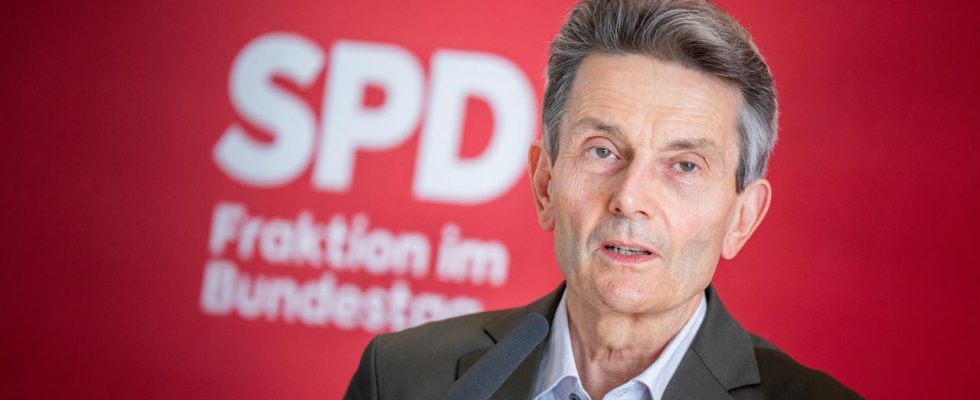In the migration debate, SPD parliamentary group leader Mützenich advocates weighing up the words – and is open to talks with the Union. Meanwhile, the states are trying to assert themselves against the federal government when it comes to sharing the burden.
The discussion about migration policy continues: the federal government, states and local authorities are struggling to find a common approach in view of the around 66 percent increase in the number of asylum applications compared to the previous year. Now there seems to be a willingness for dialogue between the opposition and the traffic light. SPD parliamentary group leader Rolf Mützenich declared himself ready to hold talks with the opposition about migration policy. If the Union “finally stops talking about only individual questions, we are very open to it,” said Mützenich before a parliamentary group meeting in Berlin.
The SPD politician called on his own coalition to moderate the dispute. Specifically, he referred to a statement by FDP General Secretary Bijan Djir-Sarai, who described the Greens as a “security risk” for the country because of their migration policy. “General secretaries must also be able to weigh their words,” said Mützenich.
Djir-Sarai said at the weekend: “Whether with reforms at the European level or with the classification of safe countries of origin: the Greens are a security risk for the country in migration policy and, through unrealistic positions, make consistent government action and cross-party solutions more difficult.”
Hat for stationary border controls
Mützenich also positioned itself in terms of content. He welcomed the plans of Interior Minister Nancy Faeser (SPD) for stationary controls at the borders with the Czech Republic and Poland in order to prevent smuggling. However, “this is not a panacea either,” said the SPD parliamentary group leader. But the controls could be “part of a constructive path.”
Faeser had long rejected stationary controls on the borders with Poland and the Czech Republic. But she has now announced that she will prepare this as a temporary measure – in addition to the veil search – in consultation with both countries.
Mützenich also recalled that it was agreed that the main focus must be on protecting the EU’s external borders. At the same time, “against the background of the growing internal market, the borders between the EU member states must remain open,” added the SPD parliamentary group leader.
Because: Prime Ministers consulted in mid-October
One point of contention in the debate is the distribution of the burden of accommodating and caring for refugees between the federal and state governments. Apparently the prime ministers of the 16 federal states want to arm themselves for negotiations with the federal government and discuss further steps earlier than previously planned. “This topic will certainly be dealt with intensively at the next Prime Minister’s Conference in mid-October,” said Lower Saxony’s Prime Minister Stephan Weil to the magazine “Stern”.
So far, the topic was only supposed to be discussed with Chancellor Olaf Scholz at the Prime Minister’s Conference (MPK) on November 6th. Before that, on October 12th, the state leaders will meet for their internal annual meeting without Scholz, at which Weil will also hand over the MPK chairmanship to the Hessian state government.
“Need a fair one Fee distribution”
Reliable federal co-financing of refugee costs is “overdue in order to bring the burdens on municipalities to a tolerable level,” emphasized Weil. The accommodation and care of the many refugees must be viewed even more than before as a joint task between the federal, state and local governments. A fair distribution of costs is needed.
“It is misleading and dangerous to make people believe that there are a few quick measures that can be implemented to significantly reduce the number of people coming to us every week,” added Weil. However, the Prime Minister of Lower Saxony considers stationary controls at the Polish border to be “useful”.
Stübgen: “Time is of the essence” for them border controls
Brandenburg’s Interior Minister Michael Stübgen sees it similarly. The CDU politician is pushing for the fixed controls to be introduced quickly. “I fundamentally welcome Nancy Faeser’s U-turn on stationary border controls – better late than never,” said Stübgen. “Now it has to be a matter of how exactly the border controls will be designed. So far not much is known – but time is of the essence.” The Interior Minister has been calling for fixed border controls for several months and hopes this will provide relief.
According to the Interior Ministry, the Brandenburg Central Immigration Office counted more than 1,900 arrivals of refugees in September. That’s an average of 77 people per day, including 55 who entered the country irregularly and were referred by the federal police.
Police union against stationary border controls
While Faeser’s initiative has received some support from politicians, the police union (GdP) is skeptical. In police work, this is seen as “not effective,” said the vice chairwoman of the GdP federal police district, Erika Krause-Schöne, to the “Rheinische Post”. Permanent stationary border controls are also a “permanent burden” and “very personnel-intensive”. The federal police would rather be able to act “agilely on the border line”.
There is also resistance from business. The head of foreign trade at the German Association of Chambers of Industry and Commerce (DIHK), Volker Treier, warned in the “Handelsblatt” of the consequences for business people, service providers, craftsmen and tourists. “Stationary controls do not bring travel and goods traffic to a standstill, but they inevitably lead to delays,” warned Treier. Politicians must therefore proceed “very sensitively” here.

